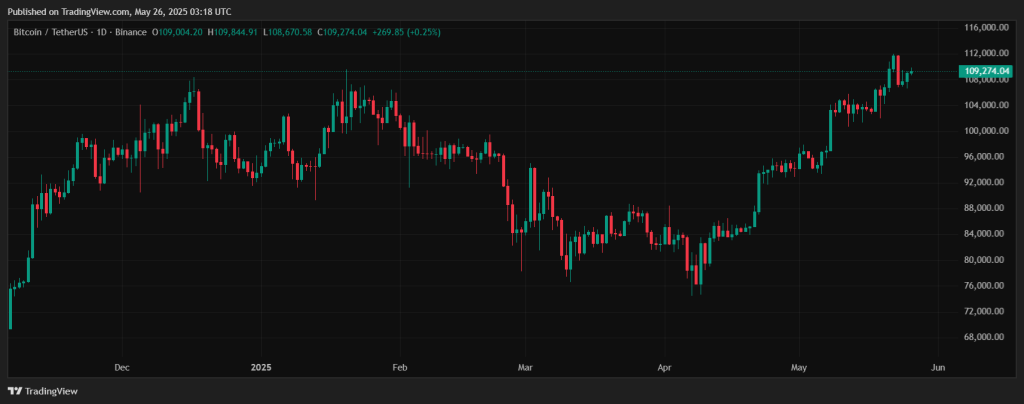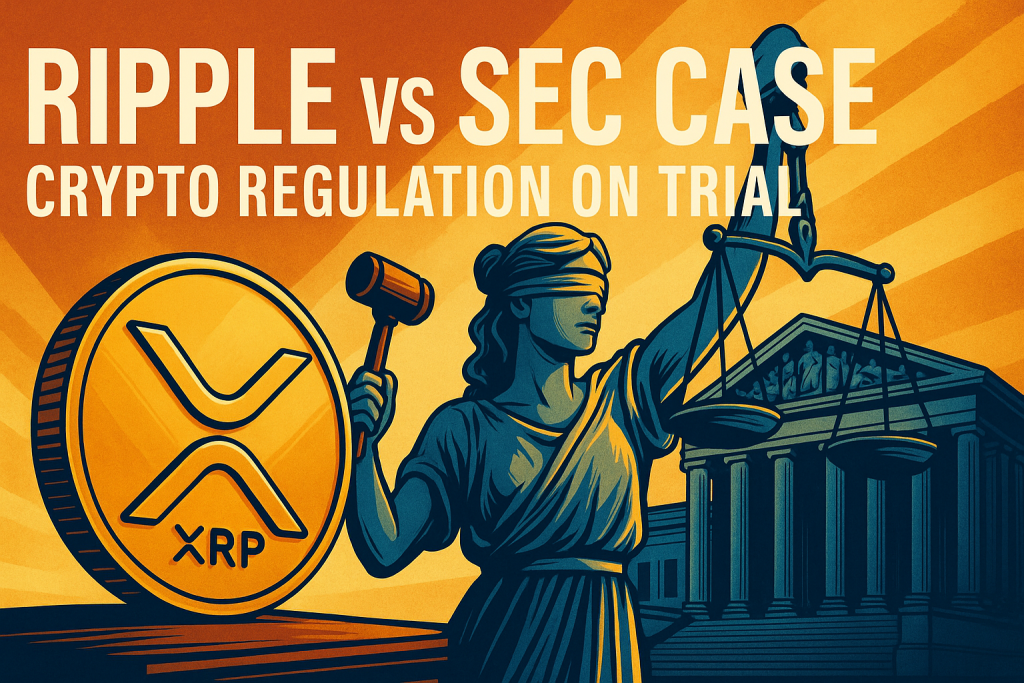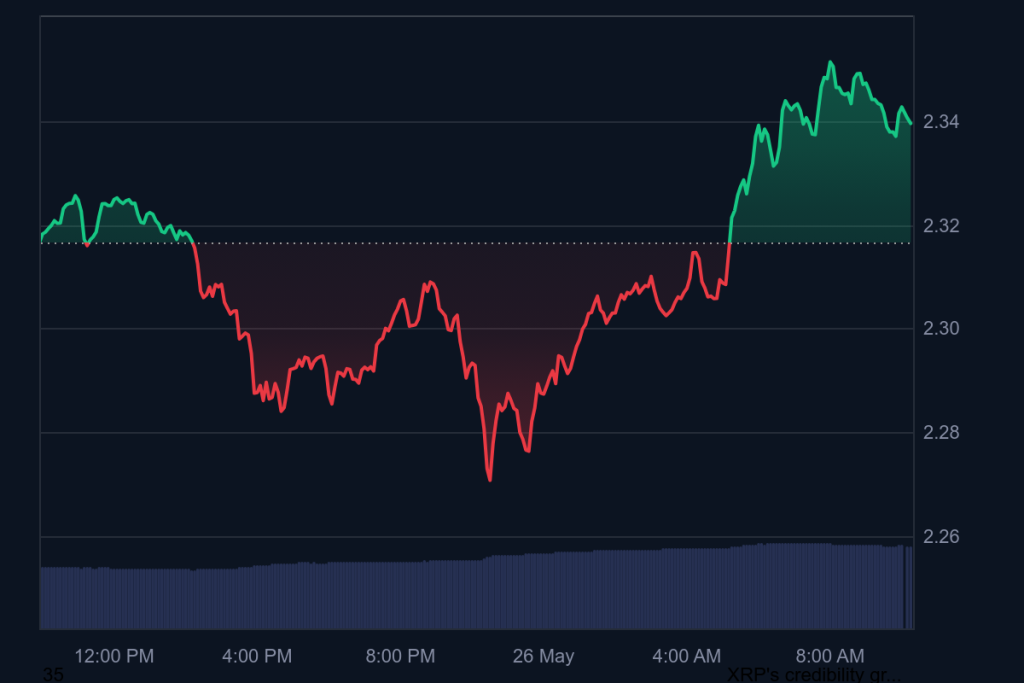In a world where the line between innovation and regulation grows increasingly blurred, the Ripple vs SEC case has become ground zero for the crypto industry’s legal reckoning. What began as a lawsuit over a $1.3 billion token sale has since evolved into a defining conflict between blockchain innovation and regulatory authority. With global markets and lawmakers watching, the Ripple vs SEC case could shape the very future of how digital assets are classified, traded, and governed worldwide.
1. A Historic Settlement Ends Crypto’s Most Watched Legal Battle
After more than four years of high-stakes litigation, the Ripple vs SEC case has officially come to an end delivering a pivotal win not just for Ripple Labs, but for the entire cryptocurrency sector. In a move that underscores a major shift in U.S. regulatory posture, the Securities and Exchange Commission (SEC) has formally dropped its case against Ripple, concluding one of the most influential legal showdowns in blockchain history.
The conclusion of the Ripple vs SEC case establishes once and for all that XRP is not a security when traded on public exchanges. This legal distinction, first introduced in Judge Analisa Torres’ July 2023 summary judgment, has now become a foundational precedent in the regulatory classification of digital assets.
Ripple’s multi-year defense came at a steep cost:
-
XRP holders lost an estimated $15 billion in market capitalization as uncertainty loomed.
-
Ripple spent over $150 million in legal fees defending against the SEC’s allegations.
But the outcome of the Ripple vs SEC case affirms Ripple’s long-standing position and delivers long-sought clarity to the industry. Under the terms of the settlement:
-
Ripple will pay $50 million to the SEC less than half the original penalty.
-
The remaining $75 million from the previously imposed $125 million fine will be waived, contingent upon Ripple’s compliance with a five-year disclosure and reporting agreement regarding institutional XRP sales.
This compliance framework set to run through 2029 includes enhanced transparency measures but also offers a structured path toward regulatory finality, something rarely seen in SEC settlements involving crypto firms.
Notably, the SEC has also dropped its appeal, and Ripple has withdrawn its cross-appeal, further cementing the resolution. The Commission clarified that its decision to end the case was not based on “the merits of the claims,” but rather reflects a broader effort to modernize and de-escalate its enforcement approach toward the crypto industry.
Ripple’s CEO, Brad Garlinghouse, called the resolution a “resounding victory” and emphasized that the lawsuit was always about more than XRP:
“The SEC used this case as a weapon to intimidate the entire crypto industry. Today, that strategy has failed.”
The Ripple vs SEC case now stands as a legal landmark a case that brought global attention to the urgent need for updated crypto regulation and laid the groundwork for future policy reforms. Its resolution removes one of the biggest regulatory overhangs in the market and sends a clear signal: U.S. crypto law is entering a new era one that demands clarity, not intimidation.
2. Why the Ripple vs SEC Case Matters for Crypto
The Ripple vs SEC case is not just a courtroom dispute it is a defining moment for the regulatory future of the cryptocurrency industry in the United States and beyond. At stake is far more than the legal status of XRP. The outcome of this case could reshape how digital assets are classified, regulated, and adopted in the years to come.
Here’s why the Ripple vs SEC case carries massive implications:
- Clarifying Legal Definitions for Digital Assets
The Ripple vs SEC case is poised to set a crucial legal precedent on whether cryptocurrencies are to be treated as securities, commodities, or a new class altogether. The decision will influence how courts, regulators, and companies approach token classification particularly those used in decentralized finance (DeFi), gaming, and enterprise blockchains.
- Shaping How Crypto Projects Launch and Operate
This case could redefine how startups and blockchain protocols issue, market, and distribute tokens. If XRP is ruled a security, new crypto projects may be required to register with the SEC or face legal consequences. On the other hand, a victory for Ripple could open the door for greater innovation and flexibility, allowing tokens to be issued and traded without the burden of legacy securities regulations.
- Pressuring Congress to Legislate
The Ripple vs SEC case has exposed the deep regulatory gaps in the U.S. legal system when it comes to crypto. With no clear framework in place, enforcement-by-lawsuit has become the de facto strategy leaving both investors and innovators in limbo. A high-profile outcome like this could catalyze Congressional action, leading to new, crypto-specific legislation that clearly defines the boundaries between the SEC, CFTC, and other regulators.
If Ripple wins, the decision could limit the SEC’s authority over digital assets and embolden other projects to resist enforcement actions potentially unleashing a new wave of development within the U.S. crypto ecosystem. It would also validate the position that not all tokens should be automatically treated as securities.
However, if the SEC prevails, the verdict could trigger a strict regulatory crackdown, with far-reaching consequences for token creators, exchanges, and DeFi platforms. Developers may be forced to relocate abroad, or drastically alter token models to avoid future enforcement.
In either scenario, the Ripple vs SEC case is set to leave a permanent mark on the global crypto landscape making it not only one of the most important legal decisions in crypto history, but a blueprint for how digital innovation and financial regulation will collide in the Web3 era.
3. A Turning Point in Crypto Law: Ripple vs SEC Case Officially Ends
In what will be remembered as a defining moment for cryptocurrency regulation, the Ripple vs SEC case has officially concluded after more than four years of legal turbulence. The U.S. Securities and Exchange Commission (SEC) has formally dropped its case against Ripple Labs, marking the end of the most closely watched enforcement action in the digital asset space. This resolution not only vindicates Ripple’s position but also sets a critical precedent for how digital tokens are treated under U.S. law moving forward.
In early 2025, both Ripple and the U.S. Securities and Exchange Commission (SEC) made the pivotal decision to withdraw their respective appeals bringing finality to the long-running Ripple vs SEC case. The SEC’s announcement clarified that its decision to drop the appeal was “not based on the merits of the claims,” signaling a broader and more deliberate shift in the agency’s enforcement strategy toward the digital asset industry. The end of the appeals process marks a critical inflection point, transforming the Ripple vs SEC case from an open legal battle into a definitive regulatory precedent.
Ripple CEO Brad Garlinghouse described the resolution as a “resounding victory,” emphasizing that the lawsuit was never simply about XRP, but about resisting regulatory intimidation tactics that threatened the future of crypto innovation in the United States. His pointed remark that “the SEC used this case as a weapon to intimidate the entire crypto industry” resonated deeply within the broader blockchain community, which has long sought fair and transparent oversight instead of legal uncertainty and aggressive enforcement.
The conclusion of the Ripple vs SEC case has now been widely recognized as a legal and regulatory landmark. It underscored the urgent need for modernized legislation tailored to the realities of digital assets, while also revealing the limits of the SEC’s ability to retroactively apply outdated securities laws to decentralized technologies. More importantly, it catalyzed a cultural shift within financial regulation pushing for a more structured, transparent, and collaborative approach to overseeing emerging technologies.
As regulatory overhang lifts and investor confidence returns, the outcome of the Ripple vs SEC case sends a powerful signal to policymakers, builders, and institutional players alike. U.S. crypto regulation is entering a new era one that demands clarity, consistency, and engagement over intimidation and ambiguity. The resolution of this landmark case not only removes a key obstacle from the market’s path but also lays the foundation for a more innovation-friendly regulatory future.
4. Market Rebound: XRP Surges, Industry Reacts to Ripple vs SEC Case Resolution
The end of the Ripple vs SEC case sparked an immediate and enthusiastic reaction from the cryptocurrency market. As one of the most anticipated legal outcomes in the industry’s history, the resolution not only lifted years of regulatory uncertainty off XRP but also bolstered broader investor sentiment across the digital asset space. The market interpreted the final settlement as a clear signal of maturing regulation and rewarded Ripple accordingly.
4.1. XRP Leads the Rally After Ripple vs SEC Case Resolution
The official conclusion of the Ripple vs SEC case triggered a powerful market reaction, with XRP leading the charge. Within hours of the announcement, XRP surged by over 13%, jumping from $2.29 to $2.56 its highest price level in several years. This explosive movement reflected renewed investor confidence and a collective sigh of relief from a market long plagued by regulatory uncertainty.
The end of the Ripple vs SEC case was seen as a turning point for XRP’s legitimacy in both U.S. and global markets. As a direct result of the resolution:
-
XRP temporarily overtook Tether (USDT) to become the third-largest cryptocurrency by market capitalization, a symbolic and strategic milestone for Ripple and its ecosystem.
-
Trading volume across major exchanges soared, underscoring renewed institutional interest and reinforcing XRP’s practical value in cross-border payment infrastructure.
The resolution of the Ripple vs SEC case didn’t just benefit XRP. It also sent bullish signals across the broader crypto market, prompting a multi-asset rally:
-
Bitcoin (BTC) climbed 2.2%, breaking through the $84,000 level.
-
Ethereum (ETH) posted a strong 6.6% gain, returning confidently above the $2,000 mark.

Analysts described the rally as a marketwide vote of confidence, fueled by the perception that the resolution of the Ripple vs SEC case might mark the beginning of a more cooperative and clearly defined regulatory era for the crypto industry in the United States.
More than a simple price jump, XRP’s surge is being viewed as a validation of its utility, legal standing, and market relevance making it not just a technical rally, but a symbolic recovery of trust.
4.2. A Legal Precedent That Reshaped Crypto Confidence
The resolution of the Ripple vs SEC case is being widely hailed as a landmark moment for cryptocurrency law one that may fundamentally reshape how digital assets are classified, regulated, and traded in the United States and beyond. Legal analysts, crypto founders, and financial commentators agree: this case set a powerful precedent with far-reaching implications across the blockchain ecosystem.
At the heart of the Ripple vs SEC case was Judge Analisa Torres’ July 2023 ruling, which introduced a critical and now court-upheld distinction between:
-
Institutional sales of XRP, which may be considered unregistered securities offerings, and
-
Programmatic sales of XRP on public exchanges, which do not constitute securities transactions under U.S. law.
This differentiation, now cemented by the final settlement, provides much-needed clarity for crypto issuers who have long operated in a regulatory gray zone. Unlike past enforcement actions such as those involving Telegram and Kik, where all token sales were treated as securities regardless of context the Ripple vs SEC case affirms that not all token distributions are created equal.
Legal experts praised the decision for its measured, case-by-case approach. Instead of applying outdated frameworks to all digital assets, the court acknowledged the complexity of blockchain-based tokens and their various sale mechanisms. As a result, the Ripple vs SEC case is now being cited as a foundational turning point in token classification jurisprudence.
The ripple effects of the Ripple vs SEC case (no pun spared) are already being felt across the industry. From DeFi protocols and NFT marketplaces to new Layer 1 networks and tokenized real-world assets (RWAs), crypto founders are now referencing this precedent when designing their compliance strategies and token issuance models.
More than just a win for Ripple, the resolution of the Ripple vs SEC case represents a strategic blueprint for future crypto projects navigating U.S. regulation. It sends a clear message to both innovators and regulators: legal nuance matters, and blanket enforcement is no longer a sustainable approach in the era of decentralized finance.
5. The Road Ahead: Clarity, Growth, and a New Regulatory Era After the Ripple vs SEC Case
With the Ripple vs SEC case officially concluded, Ripple is now positioned to accelerate its core mission scaling global cross-border payment infrastructure without the legal uncertainty that has overshadowed its operations since 2020. The resolution marks more than the end of a lawsuit; it signifies the beginning of a more mature and transparent regulatory era for the entire U.S. crypto industry.
For years, digital asset innovators have operated in a fog of regulatory ambiguity. The outcome of the Ripple vs SEC case lifts that cloud by establishing real legal benchmarks that projects can now reference as they structure token offerings, design compliance protocols, and engage with institutional investors.
The final ruling and settlement in the Ripple vs SEC case provide:
-
A clear legal distinction between institutional and programmatic token sales
-
A time-bound compliance framework through 2029, giving Ripple and others a roadmap to regulatory closure
-
A powerful signal that enforcement-heavy tactics are giving way to principled oversight and rulemaking
This landmark case is now guiding how the SEC, federal courts, and even Congress may approach digital asset classification and enforcement in the years ahead. It offers a blueprint for fair, innovation-aligned regulation, ensuring that legitimate projects are not caught in legal crossfire.
For Ripple, the resolution of the Ripple vs SEC case unlocks new opportunities whether through expanded partnerships, enterprise adoption, or even the potential launch of an XRP-based exchange-traded fund (ETF). For the broader market, it restores confidence that U.S.-based crypto innovation can thrive with the right legal clarity in place.
Ultimately, the Ripple vs SEC case has helped redefine the rules of engagement for digital finance. It stands as a powerful reminder that regulation must evolve hand-in-hand with technology not in opposition to it. And it sets a hopeful precedent: progress is possible when clarity, dialogue, and legal integrity lead the way.
Final Thought
The Ripple vs SEC case is far more than a courtroom clash it’s a defining moment that will shape the legal, technological, and economic foundations of the cryptocurrency sector for years to come. At its core, this case is about more than XRP; it’s about how we define digital value, enforce regulation without stifling innovation, and position the United States in the global race for digital asset leadership.
Whether the resolution comes through judicial victory, negotiated settlement, or legislative reform, the legacy of the Ripple vs SEC case will serve as a precedent-setting moment in blockchain history. It will inform how tokens are classified, how projects raise capital, and how institutions navigate compliance in an evolving Web3 economy.
As we approach the final ruling, one truth remains clear: the Ripple vs SEC case is not just shaping Ripple’s future it is helping write the rules of the crypto era. For ongoing updates, expert insights, and analysis on the Ripple vs SEC case and other regulatory developments in crypto, follow FMCPAY News your trusted source at the intersection of blockchain, regulation, and innovation.



